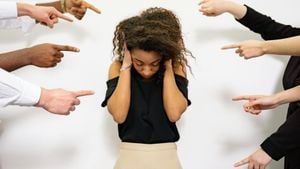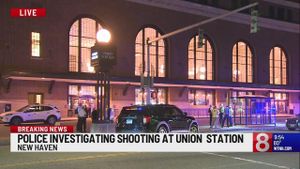Ecuador is poised for another chapter in its turbulent political saga as the presidential election heads to a second round, scheduled for April 13, 2025. A slightly unexpected twist has emerged as current President Daniel Noboa and leftist candidate Luisa González prepare to face off once again. This election’s first round, held on October 9, 2025, saw Noboa leading with 44.3 percent of the votes, just squeaking by González, who garnered 43.8 percent.
According to the National Electoral Council (CNE) of Ecuador, the voter turnout was impressive, with about 83% of over 13 million eligible voters participating. This active participation highlights the public's engagement with the democratic process, especially significant as Ecuador grapples with heightened violence and political division. The polarization between the candidates, reminiscent of last year’s election, signifies deep-seated divisions within Ecuadorian society.
Noboa’s tenure, which began under challenging circumstances, has been marked by his hardline approach to crime and narcotrafficking. Since he assumed office following the dissolution of parliament by ex-President Guillermo Lasso due to political crises, the nation has witnessed tumultuous security challenges. Revenues from the once-booming oil industry have dwindled, and pressure from narcotraffickers has created secondary crises. Noboa’s military-driven strategy to counteract this has drawn both support and criticism.
On the other side of the political spectrum, Luisa González stands as the candidate for the Citizens' Revolution party—linked to Rafael Correa, Ecuador's former president, who is currently living in exile after being convicted of corruption. González's campaign focuses on social justice and increased security, promising to rectify issues of poverty and violence without sacrificing human rights.
The electoral atmosphere has been anything but peaceful. According to reports, violence related to crime and drug trafficking has surged, bringing about serious security concerns during the election. The CNE reported taking extensive measures to guarantee safety, including closing borders and deploying thousands of police and military personnel to secure polling places, especially those in coastal areas known for high crime rates.
The atmosphere surrounding the election was tense, marked by accusations of illegal campaign practices and public safety threats. González herself accused Noboa of violating electoral laws by using public resources for his campaign, asserting, "Daniel Noboa committed an illegal act by using public funds to campaign and used his power to issue decrees to appoint vice-president." Such contentious claims have only added frictions to the political climate.
The previous election held between these two candidates took place under similarly charged circumstances when Fernando Villavicencio, another candidate, was assassinated before the votes were cast. This led many to express concerns about safety, prompting heightened security measures for the latest round of elections.
Having emerged as one of the youngest presidents globally at just 37 years old, Noboa has been characterized as politically savvy yet increasingly authoritarian. His affiliation with right-leaning political strategies, including direct ties to figures like Donald Trump, plays well within certain factions of Ecuador’s electorate. His administration has faced accusations of human rights violations as military personnel have been deployed to various regions amid increasing violence.
Despite facing scrutiny from various corners, including critiques from within his own political camp, Noboa claims improvements have been made under his administration. He highlighted decreased homicide rates, attributing it to his policies, stating, "The violence is under control, and we must continue this path." But many remain skeptical, questioning the effectiveness of using military force rather than addressing underlying socio-economic issues.
Meanwhile, González’s vision taps deeply on the historical legacy of Correa’s presidency, which, though marred by corruption claims, was also known for significant economic growth during Ecuador’s oil boom years. She hopes to rally the electorate around ideals of social fairness and integrity. Her supporters view her rise as emblematic of the fight against corruption and social inequity.
With both candidates needing to shore up support for the upcoming second round, González is likely to aim for securing left-leaning votes from smaller parties and disillusioned constituents affected by Noboa’s policies. Noboa, meanwhile, might strategize to consolidate his base and appeal to undecided voters who remain wary of swing elections and the potential return of the Correa-era politics.
The runoff will not only determine who holds the presidency for the next term but also reflect the larger ideological battle shaping Ecuador. While Noboa pushes for continuity and promises to combat crime aggressively, González invokes themes of social justice and human rights, promising reform and hopes for national healing.
It remains to be seen how the electorate will respond to this high-stakes showdown amid unprecedented challenges. April’s elections will certainly test the mettle, resilience, and aspirations of the Ecuadorian people as they seek direction for their future.



